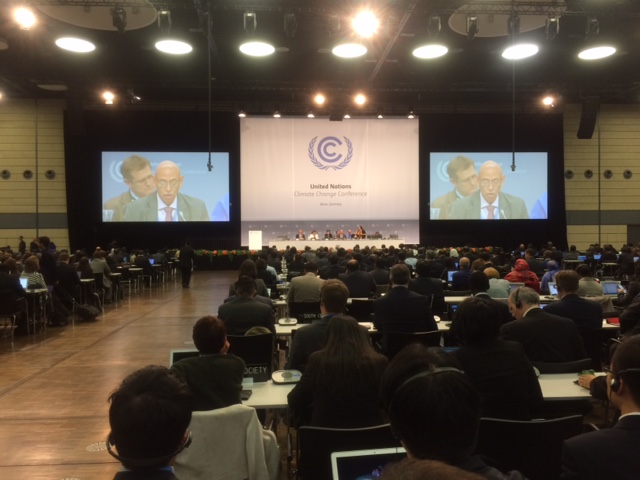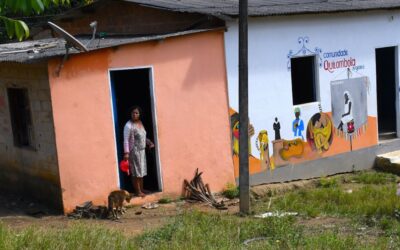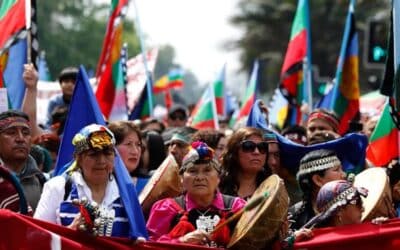By Andrey Laletin*
The twelfth session of the United Nations Forum on Forests (UNFF-12) took place at the UN headquarters in New York in May 1-5, 2017. There were more than 300 participants, but only a few representatives from the civil society, mostly UNFF focal points for the different Major Groups. The meeting addressed a number of issues, including the implementation of the UN Strategic Plan for Forests 2017-2030 (UNSPF), which was agreed in January 2017 during UNFF Working Group and Special Session; monitoring, assessment and reporting (MAR); means of implementation (MOI) and enhanced cooperation, coordination and engagement on forest-related issues.
As part of the deliberations on the Strategic Plan’s implementation, panel discussions on forests in relation to Sustainable Development Goal 1 (SDG-1) (Poverty alleviation), SDG-2 (Food security) and SDG-5 (Gender equality) also took place.
As an outcome of official negotiations UNFF12 adopted omnibus resolution that finalises proposals for all discussed issues. Below I will note the main outcomes adopted by the UNFF12. On MAR it «decides to consider at its thirteenth session the cycle and format for the first voluntary national reporting to the Forum, taking into account the work on forest indicators, relevant reporting cycles and the need to reduce reporting burdens».
The most relevant part of the resolution is devoted to enhanced cooperation, coordination and engagement on forest-related issues. It «encourages Major Groups and other relevant stakeholders to continue their involvement in the work of the Forum, including by elaborating proposals or work plans on how they can contribute to the implementation of the UNSPF (United Nations Strategic Plan for Forests 2017-2030) and the Forum’s 4POW (Forum’s Quadrennial Programme of Work 2017-2020), and to present such proposals or plans to the Forum at its thirteenth session».
As Contribution to the High Level Political Forum (HLPF) on Sustainable Development, resolution “invites Members of the Forum, CPF member organizations, UN system partners, regional and subregional organizations processes, Major Groups and other stakeholders to provide inputs to the Forum Secretariat on the contribution of forests to the issues under consideration by HLPF 2018 by 30 November 2017”. This decision of UNFF12 gives possibilities to the Global Forest Coalition and its members to contribute on SDG 12 (“Sustainable consumption and production”) and SDG 15 (Life on earth) that will be under consideration of HLPF in July 2018.
But if you are not a diplomat, you will be bored on such official meetings where country delegates argue to put comma or point and often include lots of extra words that makes texts of UN negotiations very heavy and difficult to understand by ordinary people. But I really enjoyed the side events at UNFF12, especially two of them. First one was organized by the Special Project: World Forests, Society and Environment of the International Union of Forest Research Organizations (WFSE IUFRO) on the topic: «Harnessing the potential of community and smallholder forestry for SDGs». The event highlighted that community forestry from different countries offers important lessons and that it can contribute significantly to the SDGs, but that common constraints undermine community forestry, including lack of rights (tenure), illegality and bureaucratic hurdles. Harnessing the potential of community forestry requires the development of a supportive institutional setting, unlocking economic opportunities, the realisation of education and capacity building programs and a more systematic monitoring of its outcomes.
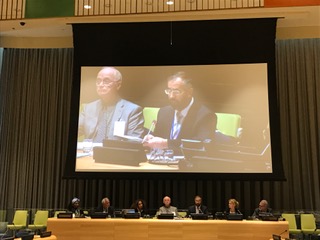
GFC colleagues Andrey Laletin of Friends of the Siberian Forests and the Russian Social-Ecological Union, and Hubertus Samangun of ICTI Tanimbar and the International Alliance of Tribal and Indigenous Peoples of the Tropical Forests speaking at a side event during the recent UN Forum on Forests
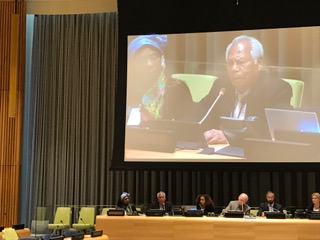
Another successful side event was organized by the International Family Forestry Alliance (IFFA) with support from UNFF Major Groups (MGs) focal points on the topic: “Can the link between sustainable management of forests and efforts to combat climate change be strengthened?” It included the presentation of a strong definition of sustainable forest management (SFM) and highlighted how SFM, if defined as such, can contribute to climate change mitigation.
This 12th session of UNFF was much more quiet and friendly in comparison with many previous sessions of UNFF. All contentious issues were successfully resolved during Working Group and Special session in January 2017, that agreed on UNSPF and the Forum’s 4POW. Negotiations on the omnibus resolution in the last day were not very long and session was closed around 1 p.m. on Friday May 5.
==========
Official materials of the session are available at the UNFF website: http://www.un.org/esa/forests/forum/current-session/index.html Earth Negotiations Bulletin covered all days of the official program of the UNFF12, see more on http://enb.iisd.org/forestry/unff/unff12/
But if you are not a diplomat, you will be bored at such official meetings where country delegates argue to put comma or point and often include lots of extra words that makes texts of UN negotiations very heavy and difficult to understand by ordinary people.
*Andrey Laletin is GFC’s Regional Resource Person, Advisor on UNFF process and Membership coordinator
Photos by Andrey Laletin

